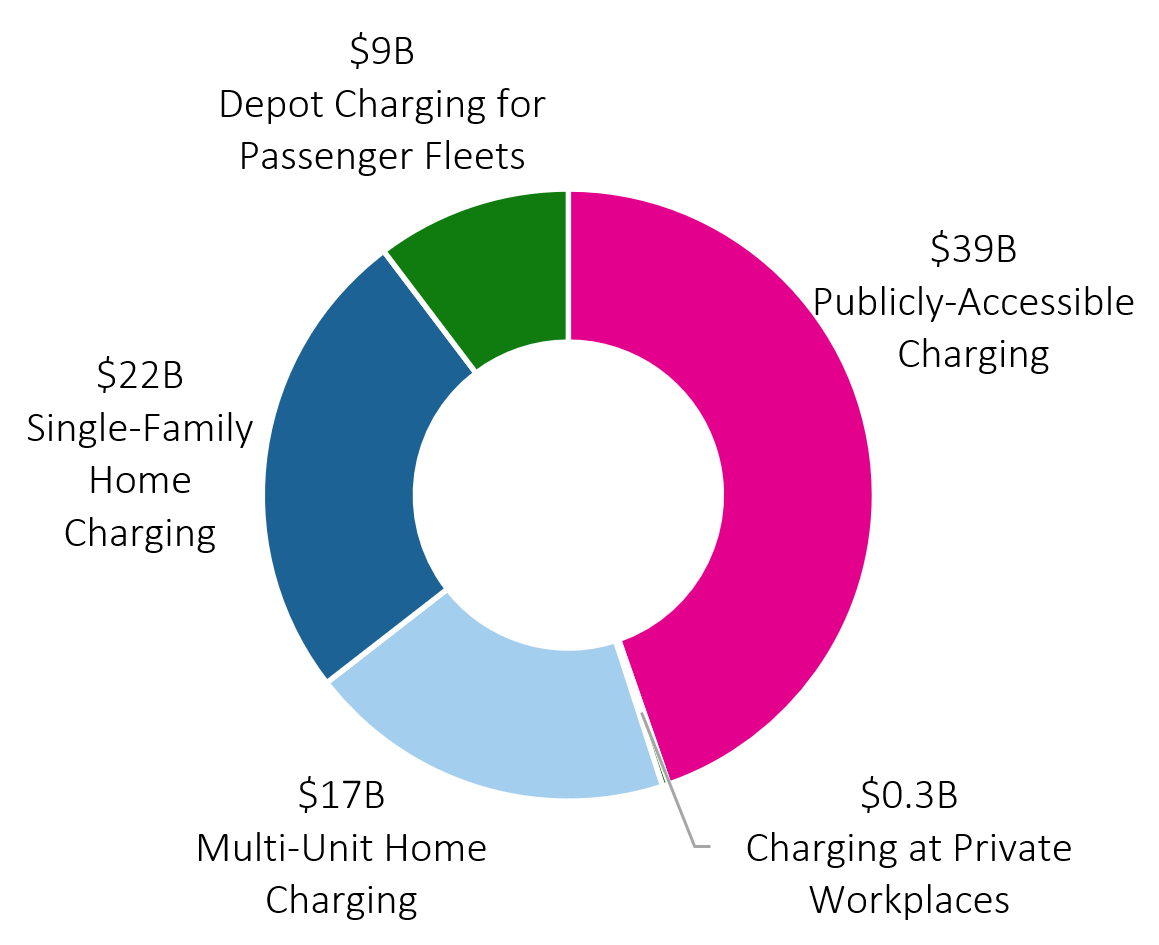WASHINGTON (April 8, 2021) – A recent analysis by Atlas Public Policy, a DC-based policy and tech firm, demonstrates that to achieve 100 percent passenger electric vehicle sales by 2035 and put the nation on the path to full electrification, over $87 billion in investments in charging infrastructure will be needed over the next decade, including $39 billion for public charging.
The need for consistent charging access throughout the country is essential to enable widespread electric vehicle adoption. Public charging infrastructure investments have emerged as a critical gap, however, since the direct revenue from providing these services often does not cover the costs of installation and operation of the equipment. The Atlas analysis demonstrates what would be required to fully fund public charging infrastructure (see figure below). The analysis also found that achieving 100 percent passenger electric vehicle sales by 2035 will require installation of an estimated 495,000 public and workplace charging ports, a finding similar to the 500,000 EV chargers called for in the American Jobs Plan.
Atlas Public Policy analysis of charging infrastructure investment needed 2021-2030 to support 100% electric vehicle sales by 2035
Atlas Public Policy analysis of charging infrastructure investment needed 2021-2030 to support 100% electric vehicle sales by 2035
Methodology
Atlas Public Policy’s analysis looked at infrastructure requirements to support 100 percent electric passenger vehicle sales in the United States by 2035. The analysis quantifies the charging ports and investments needed in each state each year over the next decade, with cost estimates reflecting the types of charging ports anticipated and local labor costs.
Significantly more investment needed
Atlas’s analysis found that the current pace of investments falls woefully short of the $87 billion required over the next decade to achieve 100 percent electric passenger vehicle sales by 2035.
While the private sector can be expected to invest in home and fleet charging, public charging investments are a gap that are unlikely to be tackled by states or the private sector in a consistent manner, significantly hindering EV adoption. Lack of public charging infrastructure is often cited as a key EV adoption barrier for consumers. It is also a key issue in ensuring equitable access to electric mobility options given the significant share of Americans without immediate access to power where they park.
Current commitments from utilities, states, and charging service providers to install public charging total less than $4.5 billion, with 80 percent of committed state dollars and 75 percent of approved utility support coming from California and New York. Some of these committed funds have already been spent, and some will go to electrifying medium- and heavy-duty vehicles. Public charging investments from automakers and charging companies to date have also been insufficient, with many pointing to the ‘chicken-and-egg’ issue of needing to see higher electric vehicle sales to rationalize investments. The Biden Administration’s American Jobs Plan is an opportunity to close the $39 billion public charging gap, catalyzing the EV transition, creating jobs, and contributing to economic activity throughout the country.
Upfront investment can save costs
Atlas’s analysis demonstrates that upfront investments to jumpstart public charging can also create significant cost savings by allowing the installation of more charging ports at each location at the outset: installing six to 10 fast charging ports at each site versus just two will save $8.4 billion in installation costs between 2021 and 2030. Installing higher-powered fast charging can also create savings while providing customer convenience: Atlas finds that installing 150-kilowatt fast chargers rather than the 350-kilowatt fast chargers modeled would increase needed investment in public infrastructure from $39 billion to $52 billion.
You can access our findings here.
Contact Lucy McKenzie (lucy.mckenzie@atlaspolicy.com, 202-753-9549) or Nick Nigro (nick.nigro@atlaspolicy.com, 202-750-4314) for more information regarding this work.
About Atlas Public Policy
Visit our newsroom for more press releases and Atlas in the news.
